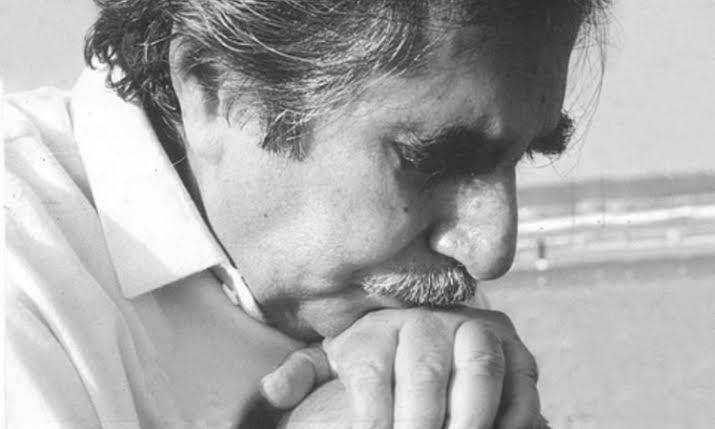
Raja Masroor writes about the great Sindhi poet and author, Shaikh Ayaz, who was a recipient of Sitara-e-Imtiaz and wrote deeply rich poetry and prose with the cardinal commitment to the themes of revolution and romance. He was also close friends with Zulfikar Ali Bhutto and an ardent follower of Shah Abdul Latif Bhitai.
Shaikh Ayaz was born in Shikarpur, an emerald, early 17th-century city of Sindh. He i is not only a prolific poet but also a very reflective prose writer. His literary journey extends to well over six rich decades of his life. He published over fifty books during his life and left the unpublished literary riches of so many books after his death. Shaikh Ayaz establishes himself as a towering literary figure during his lifetime and his work was translated into Urdu, Punjabi, English, Hindi, Bangla, Russian and French languages. He was a true internationalist who grew from the fertile land of Sindh and let the fragrance of his existence free for the world. The first and foremost poet of the oppressed. Sindh was not only Keenjhar, Karonjhar and Kasho to Shaikh Ayaz, but it was also bygone generations who say the Eid prayer with him and join him in lighting the diyas on Diwali.
One of his close companions and an eminent Sindhi storyteller Jamal Abro once stated that he had read two of his stories “Sufaid Wehshi” and “Hans Mukh” during his student life in 1941 to 1947 which left an indelible mark on his mind which was vivid even then after the lapse of good five decades.
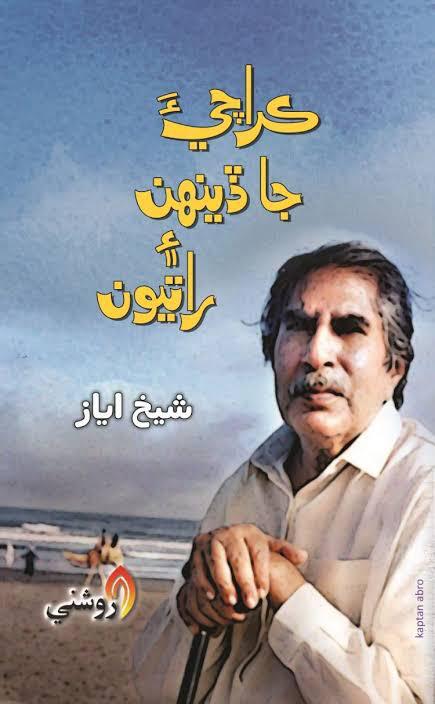
Shaikh Ayaz lived his whole life in pursuit of a vision and he turned restless whenever anything contrary to his vision occurred. Both his poetry and prose were in consonance with his vision which has a cultural and civilisational continuity of its own. He invented fresh diction for old symbols.
He was one of the prominent romantic-revolutionary Sindhi poets of Pakistan. He wrote several books on poetry, biographies, plays and short stories in both Sindhi and Urdu. His melodic Urdu translation of Shah Jo Risalo sets new standards of poetic diction in Urdu. Such a melodically classic idiom in translating the 18th century Sindhi Sufi poet Shah Abdul Latif Bhittai, from Sindhi to Urdu established him as an authority in this domain.
He was a successful legal practitioner specialising in criminal law. In addition to his legal practice in criminal law, he took upon himself to serve as the Vice-Chancellor of the Sindh University on the insistence of Zulfikar Ali Bhutto, who considered him to be a genuine intellectual and a rich cultural voice of modern Sindhi literature. He was a renowned criminal lawyer in the legal fraternity of Sukkur where he chose to establish his legal practice.
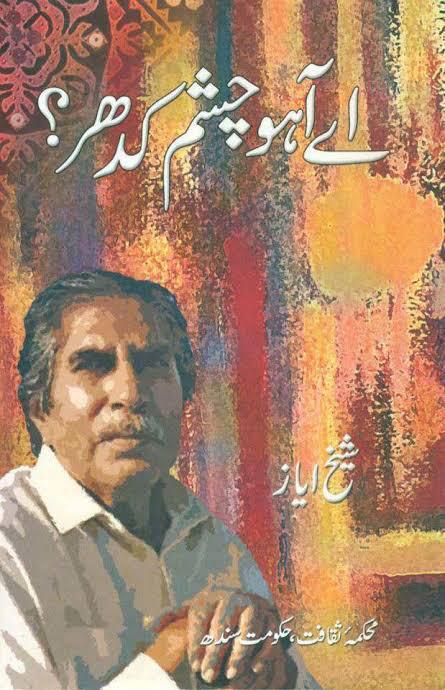
Shaikh Ayaz also joined the field of journalism which took him to the editorship of a Sindhi newspaper Barsat back in 1994. He added a unique literary flavour to the writing of editorials. He touched upon the political struggles of his time in his journalistic writings which covered a wide range of issues like Vietnam, Hongkong, Ojhri Camp, Kashmir issue, Afghan imbroglio, Hiroshima, Dreams of Yasir Arafat for Palestine & the race for nuclear weapons in Asia. The creative canvas of Shaikh Ayaz was perhaps larger than Walt Whitman though the latter claimed to contain multitudes. Shaikh Ayaz never contradicted himself in his unconditional love for his land.
His first book of Urdu poetry was Booye Gul, Nala-e-Dil and the first book of Sindhi poetry was 'Bhounr Bhire Akas'. Later, he wrote another poetry book in Urdu named 'Neel Kanth Aur Neem Ke Pattey'.
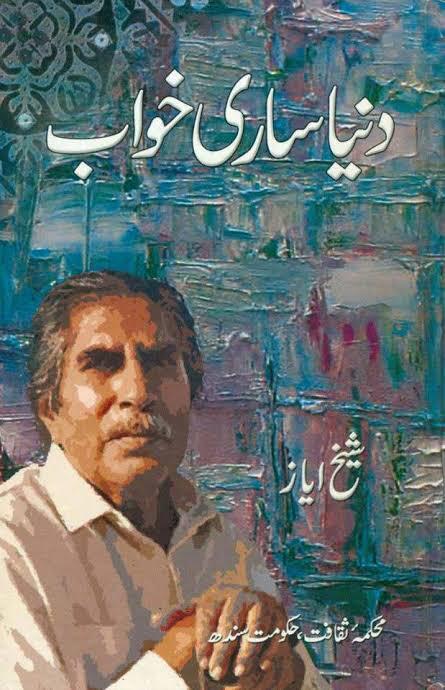
In 1977 after the arrest of Zulfikar Ali Bhutto, the Vice-Chancellor of Konya University came to visit Shaikh Ayaz at Sindh University and told him that he had brought a message of Turkish Government for General Zia to exonerate Zulfikar Ali Bhutto and not to take his life. Shaikh Ayaz writes that Bhutto was naturally fluent in English but whenever he spoke to him he turned to Sindhi.
Shaikh Ayaz was a staunch feminist and lamented the plight of Pakistani women in comparison to the women of the advanced countries. He strongly advocated for the socio-cultural emancipation of women fighting for their right for equal participation in social life. He was against the false binary of gender segregation in Pakistani society. Shaikh Ayaz idolised rebellious female characters. His most cherished ones were Quratulain Tahira & Sara Shagufta.
It is so unfortunate that much of his unpublished poetry of the pre-1947 time was misplaced and could not appear in the public domain.
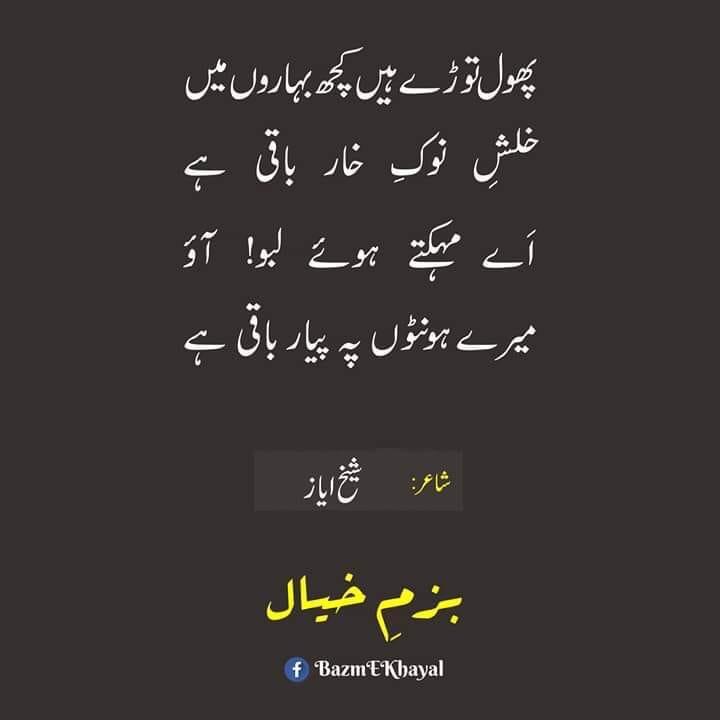
He was also a voracious reader. When he was imprisoned in Sahiwal jail, he wrote, 'Sahiwal Jail Ji Dairy' from December 1968 to January 1969. He was only allowed to keep two books with him, one was on the life of Sir Bernard Shaw and the other was the Shah Jo Risalo. Shaikh Ayaz shared a transistor radio with Zulfikar Ali Bhutto in jail which was later kicked away and destroyed by Bhutto as he felt the Ayub regime was airing fake news on the radio. Bhutto was sure that soon BBC would air the news of Ayub’s resignation.
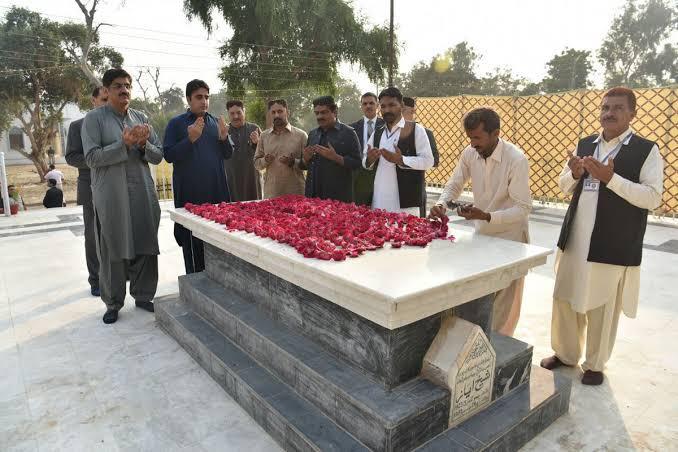
The recipient of Sitara-e-Imtiaz, Shaikh Ayaz (1923-1997) wrote deeply rich poetry and prose with the cardinal commitment to the themes of revolution and romance. He died on December 28, 1997, and was laid to rest near the shrine of his Hadi (spiritual guide) Hazrat Shah Abdul Latif Bhitai.
Shaikh Ayaz was born in Shikarpur, an emerald, early 17th-century city of Sindh. He i is not only a prolific poet but also a very reflective prose writer. His literary journey extends to well over six rich decades of his life. He published over fifty books during his life and left the unpublished literary riches of so many books after his death. Shaikh Ayaz establishes himself as a towering literary figure during his lifetime and his work was translated into Urdu, Punjabi, English, Hindi, Bangla, Russian and French languages. He was a true internationalist who grew from the fertile land of Sindh and let the fragrance of his existence free for the world. The first and foremost poet of the oppressed. Sindh was not only Keenjhar, Karonjhar and Kasho to Shaikh Ayaz, but it was also bygone generations who say the Eid prayer with him and join him in lighting the diyas on Diwali.
One of his close companions and an eminent Sindhi storyteller Jamal Abro once stated that he had read two of his stories “Sufaid Wehshi” and “Hans Mukh” during his student life in 1941 to 1947 which left an indelible mark on his mind which was vivid even then after the lapse of good five decades.

Shaikh Ayaz lived his whole life in pursuit of a vision and he turned restless whenever anything contrary to his vision occurred. Both his poetry and prose were in consonance with his vision which has a cultural and civilisational continuity of its own. He invented fresh diction for old symbols.
He was one of the prominent romantic-revolutionary Sindhi poets of Pakistan. He wrote several books on poetry, biographies, plays and short stories in both Sindhi and Urdu. His melodic Urdu translation of Shah Jo Risalo sets new standards of poetic diction in Urdu. Such a melodically classic idiom in translating the 18th century Sindhi Sufi poet Shah Abdul Latif Bhittai, from Sindhi to Urdu established him as an authority in this domain.
He was a successful legal practitioner specialising in criminal law. In addition to his legal practice in criminal law, he took upon himself to serve as the Vice-Chancellor of the Sindh University on the insistence of Zulfikar Ali Bhutto, who considered him to be a genuine intellectual and a rich cultural voice of modern Sindhi literature. He was a renowned criminal lawyer in the legal fraternity of Sukkur where he chose to establish his legal practice.

Shaikh Ayaz also joined the field of journalism which took him to the editorship of a Sindhi newspaper Barsat back in 1994. He added a unique literary flavour to the writing of editorials. He touched upon the political struggles of his time in his journalistic writings which covered a wide range of issues like Vietnam, Hongkong, Ojhri Camp, Kashmir issue, Afghan imbroglio, Hiroshima, Dreams of Yasir Arafat for Palestine & the race for nuclear weapons in Asia. The creative canvas of Shaikh Ayaz was perhaps larger than Walt Whitman though the latter claimed to contain multitudes. Shaikh Ayaz never contradicted himself in his unconditional love for his land.
His first book of Urdu poetry was Booye Gul, Nala-e-Dil and the first book of Sindhi poetry was 'Bhounr Bhire Akas'. Later, he wrote another poetry book in Urdu named 'Neel Kanth Aur Neem Ke Pattey'.

In 1977 after the arrest of Zulfikar Ali Bhutto, the Vice-Chancellor of Konya University came to visit Shaikh Ayaz at Sindh University and told him that he had brought a message of Turkish Government for General Zia to exonerate Zulfikar Ali Bhutto and not to take his life. Shaikh Ayaz writes that Bhutto was naturally fluent in English but whenever he spoke to him he turned to Sindhi.
Shaikh Ayaz was a staunch feminist and lamented the plight of Pakistani women in comparison to the women of the advanced countries. He strongly advocated for the socio-cultural emancipation of women fighting for their right for equal participation in social life. He was against the false binary of gender segregation in Pakistani society. Shaikh Ayaz idolised rebellious female characters. His most cherished ones were Quratulain Tahira & Sara Shagufta.
It is so unfortunate that much of his unpublished poetry of the pre-1947 time was misplaced and could not appear in the public domain.

He was also a voracious reader. When he was imprisoned in Sahiwal jail, he wrote, 'Sahiwal Jail Ji Dairy' from December 1968 to January 1969. He was only allowed to keep two books with him, one was on the life of Sir Bernard Shaw and the other was the Shah Jo Risalo. Shaikh Ayaz shared a transistor radio with Zulfikar Ali Bhutto in jail which was later kicked away and destroyed by Bhutto as he felt the Ayub regime was airing fake news on the radio. Bhutto was sure that soon BBC would air the news of Ayub’s resignation.

The recipient of Sitara-e-Imtiaz, Shaikh Ayaz (1923-1997) wrote deeply rich poetry and prose with the cardinal commitment to the themes of revolution and romance. He died on December 28, 1997, and was laid to rest near the shrine of his Hadi (spiritual guide) Hazrat Shah Abdul Latif Bhitai.
